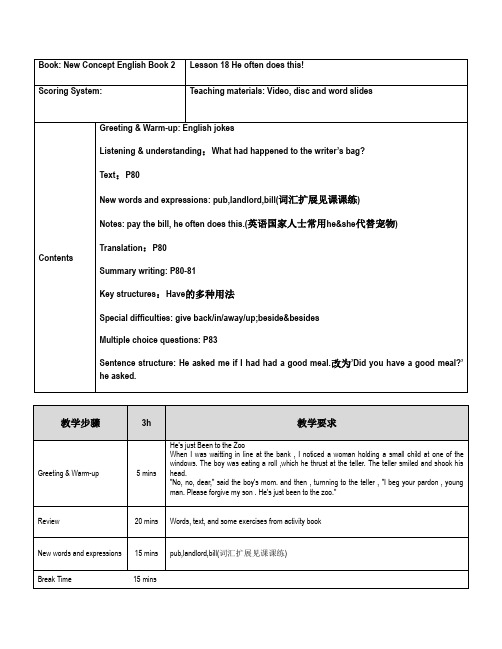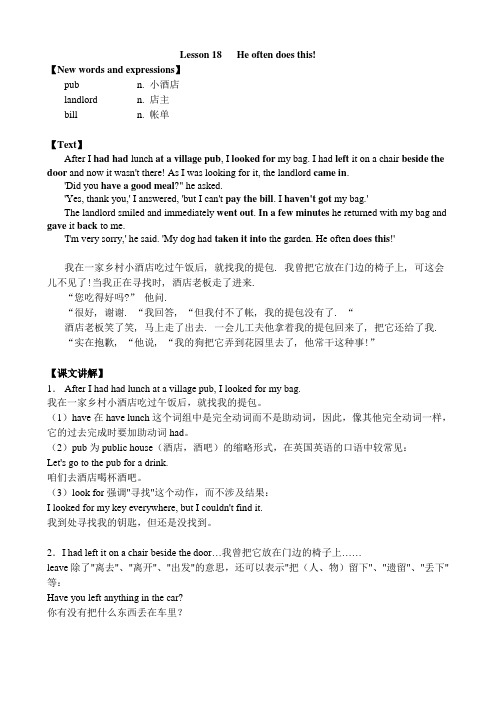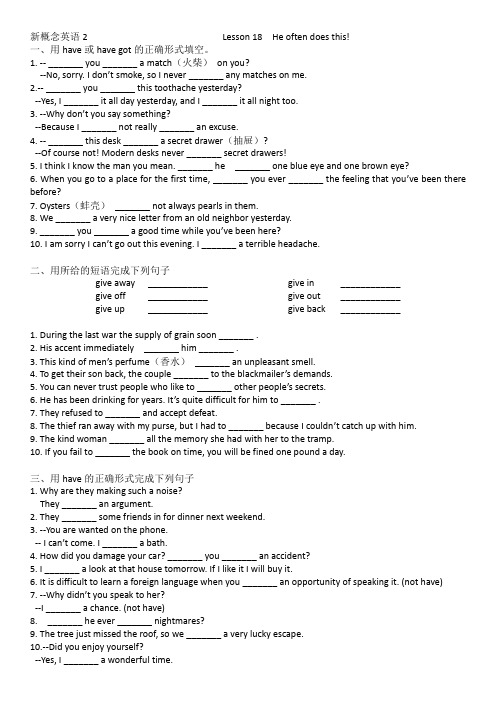Lesson 18 He often does this
- 格式:docx
- 大小:35.66 KB
- 文档页数:10



Lesson 18 He often does this!【New words and expressions】pub n. 小酒店landlord n. 店主bill n. 帐单【Text】After I had had lunch at a village pub, I looked for my bag. I had left it on a chair beside the door and now it wasn't there! As I was looking for it, the landlord came in.'Did you have a good meal?" he asked.'Yes, thank you,' I answered, 'but I can't pay the bill. I haven't got my bag.'The landlord smiled and immediately went out. In a few minutes he returned with my bag and gave it back to me.'I'm very sorry,' he said. 'My dog had taken it into the garden. He often does this!'我在一家乡村小酒店吃过午饭后, 就找我的提包. 我曾把它放在门边的椅子上, 可这会儿不见了!当我正在寻找时, 酒店老板走了进来.“您吃得好吗?”他问.“很好, 谢谢. “我回答, “但我付不了帐, 我的提包没有了. “酒店老板笑了笑, 马上走了出去. 一会儿工夫他拿着我的提包回来了, 把它还给了我.“实在抱歉, “他说, “我的狗把它弄到花园里去了, 他常干这种事!”【课文讲解】1.After I had had lunch at a village pub, I looked for my bag.我在一家乡村小酒店吃过午饭后,就找我的提包。

Lesson 18 He often does this! 他经常干这种事!After I had had lunch at a village pub, I looked for my bag. I had left it on a chair beside the door and now it wasn't there! As I was looking for it, the landlord came in.'Did you have a good meal?’ he asked.'Yes, thank you,' I answered, 'but I can't pay the bill. I haven't got my bag.'The landlord smiled and immediately went out. In a few minutes he returned with my bag and gave it back to me.'I'm very sorry,' he said. 'My dog had taken it into the garden. He often does this!'New words and expressions 生词和短语pub n. 小酒店landlord n. 店主bill n. 帐单参考译文我在一家乡村小酒店吃过午饭后,就找我的提包。
我曾把它放在门边的椅子上,可这会儿不见了!当我正在寻找时,酒店老板走了进来。
“您吃得好吗?”他问。
“很好,谢谢。
”我回答,“但我付不了帐,我的提包没有了。
”酒店老板笑了笑,马上走了出去。
一会儿工夫他拿着我的提包回来了,把它还给了我。
“实在抱歉,”他说,“我的狗把它弄到花园里去了,他常干这种事!”1.He often does this! 他经常干这种事!he 在这里指代的是狗。

新概念英语2 Lesson 18 He often does this!一、用have或have got的正确形式填空。
1. -- _______ you _______ a match(火柴)on you?--No, sorry. I don’t smoke, so I never _______ any matches on me.2.-- _______ you _______ this toothache yesterday?--Yes, I _______ it all day yesterday, and I _______ it all night too.3. --Why don’t you say something?--Because I _______ not really _______ an excuse.4. -- _______ this desk _______ a secret drawer(抽屉)?--Of course not! Modern desks never _______ secret drawers!5. I think I know the man you mean. _______ he _______ one blue eye and one brown eye?6. When you go to a place for the first time, _______ you ever _______ the feeling that you’ve been there before?7. Oysters(蚌壳)_______ not always pearls in them.8. We _______ a very nice letter from an old neighbor yesterday.9. _______ you _______ a good time while you’ve been here?10. I am sorry I can’t go out this evening. I _______ a terrible headache.二、用所给的短语完成下列句子give away ____________ give in ____________give off ____________ give out ____________give up ____________ give back ____________1. During the last war the supply of grain soon _______ .2. His accent immediately _______ him _______ .3. This kind of men’s perfume(香水)_______ an unpleasant smell.4. To get their son back, the couple _______ to the blackmailer’s demands.5. You can never trust people who like to _______ other people’s secrets.6. He has been drinking for years. It’s quite difficult for him to _______ .7. They refused to _______ and accept defeat.8. The thief ran away with my purse, but I had to _______ because I couldn’t catch up with him.9. The kind woman _______ all the memory she had with her to the tramp.10. If you fail to _______ the book on time, you will be fined one pound a day.三、用have的正确形式完成下列句子1. Why are they making such a noise?They _______ an argument.2. They _______ some friends in for dinner next weekend.3. --You are wanted on the phone.-- I can’t come. I _______ a bath.4. How did you damage your car? _______ you _______ an accident?5. I _______ a look at that house tomorrow. If I like it I will buy it.6. It is difficult to learn a foreign language when you _______ an opportunity of speaking it. (not have)7. --Why didn’t you speak to her?--I _______ a chance. (not have)8. _______ he ever _______ nightmares?9. The tree just missed the roof, so we _______ a very lucky escape.10.--Did you enjoy yourself?--Yes, I _______ a wonderful time.。

Lesson18 He often does this 课⽂内容: After I had had lunch at a village inn, I looked for my bag. I had left it on a chair beside the door and now it wasn't there ! As I was looking for it, the inn-keeper came in. ‘Did you have a good meal ' he asked. ‘Yes, thank you,' I answered, ‘but I can't pay the bill. I haven't got my bag.' The inn-keeper smiled and immediately went out. In a few minutes he returned with my bag and gave it back to me. ‘I'm very sorry,' he said ' My dog had taken it into the garden. He often does this.' 本⽂语法:have的时态和变化 语法归纳:have作实义动词意为“拥有”,作助动词帮助构成完成时态。
1)作实义动词,意为“拥有”(=own, possess,have got): I have over a thousand books. = I own / possess over a thousand books 我有1000 多本书。
Did you have plenty of time to see your mother?你有⾜够的时间去看望你母亲吗? Have you got any views about this new plan?对于这个新计划你有何看法?(在英式⼝语中常⽤ have got代替have。
常干这这种事!Lesson 18 He often does this! 他经常干First listen and then answer the question.听录音,然后回答以下问题。
What had happened to the writer's bag?After I had had lunch at a village pub, I looked for my bag. I had left it on a chair beside the door and now it wasn't there! As I was looking for it, the landlord came in.‘Did you have a good meal?’he asked.‘Yes, thank you, ’I answered, ‘but I can't pay the bill . I haven't got my bag. ’The landlord smiled and immediately went out. In a few minutes he returned with my bag and gave it back to me.‘I'm very sorry, ’he said. ‘My dog had taken it into the garden. He often doesthis!’和短语语New words and expressions 生词和短pub(1. 1)/p)b/n. 小酒店bill(1. 5)/bil/n. 帐单landlord(1. 3)/'l$ndl&:d/n. 店主文注释释Notes on the text 课文注1 pay the bill, 付帐。
2 He often does this. 他经常干这种事。
常干这这种事!Lesson 18 He often does this! 他经常干First listen and then answer the question.听录音,然后回答以下问题。
What had happened to the writer's bag?After I had had lunch at a village pub, I looked for my bag. I had left it on a chair beside the door and now it wasn't there! As I was looking for it, the landlord came in.‘Did you have a good meal?’he asked.‘Yes, thank you, ’I answered, ‘but I can't pay the bill . I haven't got my bag. ’The landlord smiled and immediately went out. In a few minutes he returned with my bag and gave it back to me.‘I'm very sorry, ’he said. ‘My dog had taken it into the garden. He often doesthis!’和短语语New words and expressions 生词和短pub(1. 1)/p)b/n. 小酒店bill(1. 5)/bil/n. 帐单landlord(1. 3)/'l$ndl&:d/n. 店主文注释释Notes on the text 课文注1 pay the bill, 付帐。
2 He often does this. 他经常干这种事。
Lesson 18 He often does this! 【New words and expressions】生词和短语(3) pub n. 小酒店 landlord n. 店主 bill n. 帐单 【课文讲解】 1、After I had had lunch at a village pub, I looked for my bag. Pub 是public house(酒店,酒店)的缩写 Let’s go to the pub for a drink. 2、I had left it on a chair beside the door and now it wasn't there! leave除了“离去,离开,出发”的意思,还可以表示“把(人、物)留下,遗留,丢下”等。 Have you left anything in the car? 3、'I'm very sorry,' he said. 'My dog had taken in into the garden. He often does this!' he指店主的狗,英语国家人士常用人称代词he或she指自己喂养的宠物。 have的用法 1、have作为助动词构成各种完成时和完成进行时 2、have还可以作完全动词,当作“具有、拥有”讲时,它和have got通常可以互换。have做“有, 患 病” 概念时, 可作为实义动词, 也可作为非实义动词。在英国英语中的疑问句和否定句中have(具有)的 用法与be 相同,即可以不用助动词do或did;在美国英语中,常用do助动词和have一起构成疑问句 和否定句。 I don’t have a pen/a headache. I haven’t a pen /a headache. 三种情况have 可以用have got 取代 I have a pen. I have got a pen. “有” I have a headache. I have got a headache. “得病” have to== have got to have 作“具有,拥有”讲时是状态动词,不能用于进行时态或被动语态,通常用于一般现在时。在其 它时态中,一般用have而不用have got。 You can have these apples if you want them. I’ve got a lot more. 如果你想要这些苹果你可以把它们拿走。我还有许多。 He must be very fond of animals to have five dogs. 他一定非常喜欢动物,才会养五条狗。 3、have作完全动词时,还可以表示eat,drink,enjoy,take等意思,这时它是行为动词,可以用于包 括进行时的各种时态。当have用于表示这些含义时,它必须与助动词do等连用以构成疑问句或否定句。 have dinner,have a cigarette,have coffee,have a holiday,have a good time,have a swim,have a rest Exercises C 在下面哪几句话中可用have got来代替have? 1 He had a drink before dinner. ⑴...不换... 2 Mrs. Sullivan has a lot of money. ⑵...换... 有钱 3 He had to leave early. ⑶...换... 4 We have had a long conversation. ⑷...不换... 进行 5 My mother has a headache. ⑸...换... 患病 6 They had a good time at the party. ⑹...不换... have a good/long time : 过的愉快(固定短语) 7 This sock has a hole in it. ⑺...换... 8 She has to be patient with him. ⑻...换... has to patient n.病人, 患者adj.忍耐的, 耐心的 9 I have a bath every day. ⑼...不换... have a swim,have a bath 10 This room has four windows. ⑽...换... 11 He has a farm. ⑾...换... 12 We had a letter from Jill yesterday. ⑿...不换... have a letter from==receive a letter from 收到 【Special Difficulties】 give 的几个固定搭配 give常用含义是“给予,交给” I lent him some books last month and he has given them back to me this morning. gave away 赠送 He gave away all his books to the library. give in 上交,呈交;屈服,让步,投降 Give in your examination papers after you’ve finished. You can do what you like. I will never give in. give up doing sth. 放弃,抛弃 He gave up drinking a few years ago. give up 交出,让出 Jack has given up the watch he stole last week. Three of our officers gave themselves up to the enemy. 我方的三名军官向敌人投降了。 Beside and Besides beside pron. 在„„旁边,在„„附近 Come and sit beside us. besides adv. 而且,并且,此外;pron. 除„„之外(还) She has so much else to do besides. 此外,她还有许多其他事要做。 I’m quite busy today. Besides, I’ve got a bad cold. There were a lot of people at the party besides us. Lesson 19 Sold out 【New words and expressions】生词和短语(6) hurry v. 匆忙 ticket office 售票处 pity n. 令人遗憾的事 exclaim v. 大声说 return v. 退回 sadly adv. 悲哀地,丧气地 ★hurry v. 匆忙 ① vi. 赶紧,赶快,匆忙 When he saw that it was already eight o’clock, he hurried to the office. ② n. 急忙,匆忙,仓促 In his hurry, he dropped some coins on the floor. in a hurry 匆忙 If you are not in a hurry. 如果你不急(时间、动作上的紧急) If you are not busy. 如果你不忙(行为上的匆忙) in no hurry 不匆忙 I am in no hurry. 我不急 hurry up 快点 hurry to 匆匆忙忙地去 He goes to school. = He hurries to school. come in 进来 hurry in 匆匆忙忙地进来 go out 出去 hurry out 匆匆忙忙地出去 ★pity n. 令人遗憾的事 What a pity! 真遗憾! It is a pity to be grown up. (it 做形式主语) It is a pity to steal a bicycle. I am sorry. 我感到很遗憾. I am sorry to hear that.听到这个消息我很遗憾 注意 sorry 与pity 词性上的区别 ★exclaim v. 大声说 ① vt.&vi.(由于痛苦、愤怒、惊异、欣喜等)叫喊,惊叫 When she saw the gift, she exclaimed in delight. ② vi.(表示抗议等)大声叫喊 She exclaimed against the rudeness of the young man. shout =cry =call out 大声喊 ★return v. 退回 ① vi. 回,返回 Tim has just returned fromAustralia. return to 回来 return to China/Beijing 回到中国/北京 ②vt. 把„„送回,归还,退回 He returned the books to the library. return to you 退回你 return money =pay back =repay 还钱 ★sadly adv. 悲哀地, 丧气地 涵盖了所有悲哀 【课文讲解】 1、'The play may begin at any moment,' I said. at any moment 在任何时候, 随时